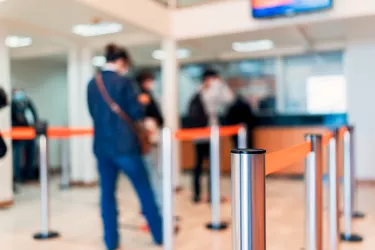
If you're planning to cash a large check, you might wonder if the IRS will know about it. While checks do leave a paper trail that allows them to be traced, the IRS only tracks them in specific conditions under the Bank Secrecy Act, as well as during audit investigations. As long as you're not doing illegal activities, such as hiding income or committing check fraud, you shouldn't experience personal finance effects, even if your bank is required to report a check to the IRS.
Does the IRS Track Checks Cashed at Banks?
Video of the Day
Per the federal law called the Bank Secrecy Act, financial institutions must report certain large transactions to the IRS. These include cash payment transactions exceeding $10,000 and certain traveler's checks, money orders and cashier's checks that are written for $10,000 or less. However, reporting only applies if there's a suspicion about the customer's intent regarding avoiding reporting or if the check is for one of these retail sale transactions:
Video of the Day
- Sale of collectible items
- Sales of certain personal-use properties (such as cars and boats) that cost more than $10,000, are tangible and have a useful life of over a year
- Payment for travel and entertainment costs for one trip with a cost exceeding $10,000
The IRS specifies that personal checks are not included in these reporting requirements; neither are money orders, cashier's checks or traveler's checks not fitting the above criteria. Therefore, most everyday check transactions don't get reported to the IRS. The exception would be if the IRS needs to look at your banking activities during an audit or has suspicions about a specific check you cashed and needs to do an investigation.
Banks’ Reporting Obligations and Audit Investigations
When you cash a reportable check at your bank or credit union, you'll get notified that the institution must fill out IRS Form 8300, Report of Cash Payments Over $10,000 Received in a Trade of Business. The IRS says this form will ask for the following information, some of which you'll need to provide along with your photo ID:
- Your name, Social Security number, contact information and photo ID details
- The contact and identification information for anybody you're cashing the check on behalf of
- The transaction details, including the date, type and amount of the check, number of total payments, check issuer's name and transaction type
- The bank's name and contact details, and the signature, name and phone number of the person filling out the form
- Additional information for other people involved with the check transaction
The bank will send the finished Form 8300 to the IRS. In addition, the Federal Deposit Insurance Corporation (FDIC) says it will need to file a Currency Transaction Report – used to try to identify and prevent money laundering – except for certain exempt transactions.
In other cases where the IRS audits your tax return, it could ask you for credit card or bank account information to look for any suspicious activity that indicates you're not reporting income or expenses correctly or you're committing some other type of fraud. This usually means showing your bank statements voluntarily or else having the IRS subpoena your bank for them.
During the audit, the IRS can request specific details for a suspicious check you've cashed or deposited. If you didn't report your tax information correctly, you can end up with a tax bill and penalties and possibly legal consequences depending on the situation. The IRS can also levy your bank account if you have unresolved tax debt.
Common Questions About Tracing Checks
Here are answers to common FAQs about check cashing and tracing.
Is ID Required for Cashing Checks?
Most financial institutions, check cashing stores and retailers offering check cashing services will require a driver's license or other valid photo ID. This lets them verify that you're the payee and not someone else trying to commit check fraud. However, Huntington says you can do ATM and mobile check deposits without needing an ID.
How Are Checks Over $10,000 Tracked?
The IRS reporting requirements only apply to specific types of checks that are under $10,000 and fit certain transaction criteria. Therefore, the IRS usually wouldn't track a personal check you deposit or cash of any amount. The exception is if you're under an audit investigation and the auditor has concerns that the check may be unreported income.
Can I Cash a Check Without Leaving a Paper Trail?
Unlike with cash deposits, checks naturally leave a paper trail for both the check issuer and the payee. This means there will always be recorded information about the payer who wrote the check and the payee who endorses and cashes it. Financial institutions also keep canceled checks on file for seven years, notes the Consumer Financial Protection Bureau.
- Huntington: How To Cash a Check Without a Bank Account or ID
- Consumer Financial Protection Bureau: My Bank/Credit Union No Longer Provides Copies of My Cancelled Checks With My Statement. Can the Bank/Credit Union Do That?
- IRS: IRS Form 8300 Reference Guide
- IRS: Form 8300 and Reporting Cash Payments of Over $10,000
- IRS: Form 8300
- Federal Deposit Insurance Corporation: Currency Transaction Reporting
- IRS: IRS Audits
- IRS: Levy